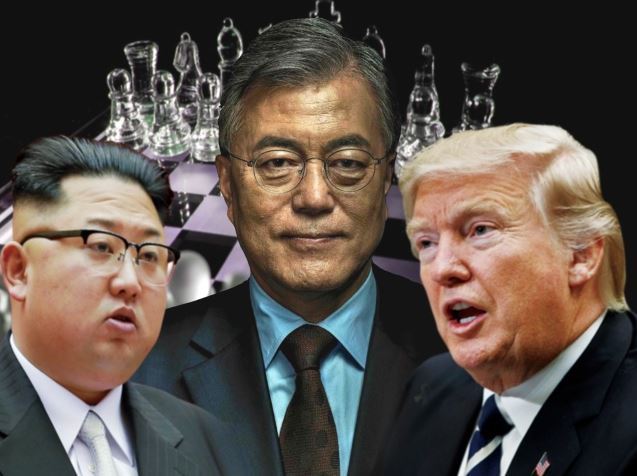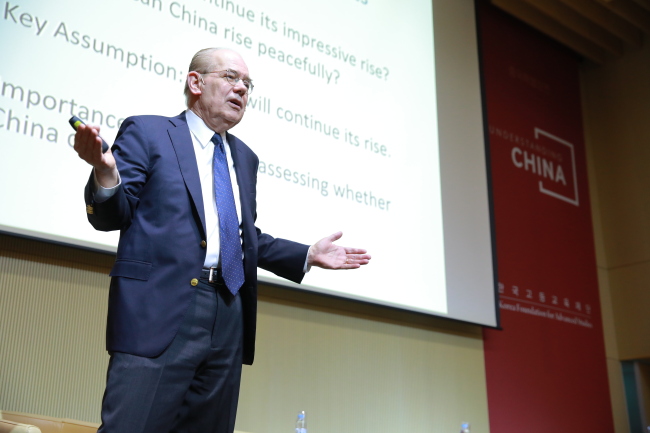Despite high hopes for the historic summit between US President Donald Trump and North Korea’s Kim Jong-un, their first-ever encounter carries the risks of ending in failure and bringing tension back to the Korean Peninsula, a prominent US security scholar warned.
John Mearsheimer, a professor at the University of Chicago, said there is a chance that the Trump-Kim summit may not materialize, or if the talks fail, the two counties could return to the level of animosity of last year.
“It’s not clear whether they will meet … there is hardly any preparations for the meeting and there is a good chance they won’t meet,” Mearsheimer said during a lecture hosted by the Korea Foundation for Advanced Studies on Wednesday.
“The great danger there is that if the summit happens between Kim Jong-un and Trump and it fails, then you could end up in a situation where relations between the US and North Korea are worse after the failed summit than they have been over the past years.”
 |
| (Herald DB) |
Tension on the Korean Peninsula had escalated last year, with Trump and Kim exchanging war-like rhetoric with each other. Trump threatened to attack North Korea with “fire and fury,” prompting Kim to call Trump a “mentally deranged dotard.”
The bellicose mood shifted this year when Kim made a diplomatic overture by inviting South Korea’s President Moon Jae-in and Trump for summits. Kim even expressed willingness to bring denuclearization to the negotiation table.
But Mearsheimer said there are no incentives for the nuclear-armed North Korea to give up its nuclear weapons, saying the North is in a “completely different” situation from countries that abandoned their nuclear weapons when the Cold War ended in the 1990s.
“I can’t think of a country that needs nuclear weapons more than North Korea because you all know that the US is into a regime change,” the scholar said, referring to previous debates over military strikes on North Korea within the Trump’s administration.
“From their point of view, it will make eminently good sense. We don’t see any evidence that the US, which has the most powerful conventional forces in the world, is giving up their nuclear weapons. So why would you expect North Korea to do so?”
Regarding President Moon’s engagement policy with North Korea, Mearsheimer said it is helpful in reducing inter-Korean tensions for now, but its longer-term implications remain to be seen, as the prospects of the summits with North Korea look bleak.
 |
| John Mearsheimer, a professor at the University of Chicago. (Korea Foundation for Advanced Studies) |
“I think it is very smart policy. He did everything possible to tamp down the tension and get the US and North Korea to walk away from the cliff. I think President Moon did the right thing and pushed us in that direction.”
“How it plays out in the long term? It’s very hard to say. It’s not clear if there will be a happy ending to the summit. I think it’s more likely there will be an unhappy ending. … For the time being, I think it is good to walk away from the crisis.”
Mearsheimer has long asserted that the US and China would end up in a “security competition” that could end in major conflicts and that Washington should contain the rise of China by building a “balancing coalition.”
In his perspective, the security landscape surrounding East Asia is much more precarious than during the Cold War, and the likelihood of war between the US and China is higher than between the US and the Soviet Union.
But the scholar predicted such a scenario would not be fulfilled in the foreseeable future, as China wants to avoid conflicts — particularly those with the US and its allies — until it becomes powerful enough to compete with Washington.
“The Chinese are fully aware that provoking the US is not a good idea. … I think the Chinese understand that time is on their side (and) now is not the time to provoke the crisis,” he said.
By Yeo Jun-suk (jasonyeo@heraldcorp.com)

